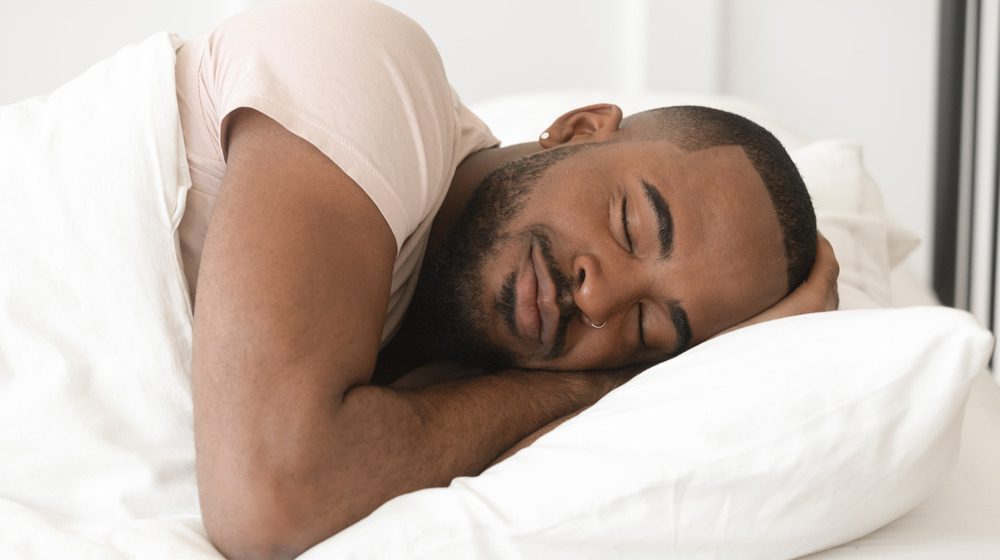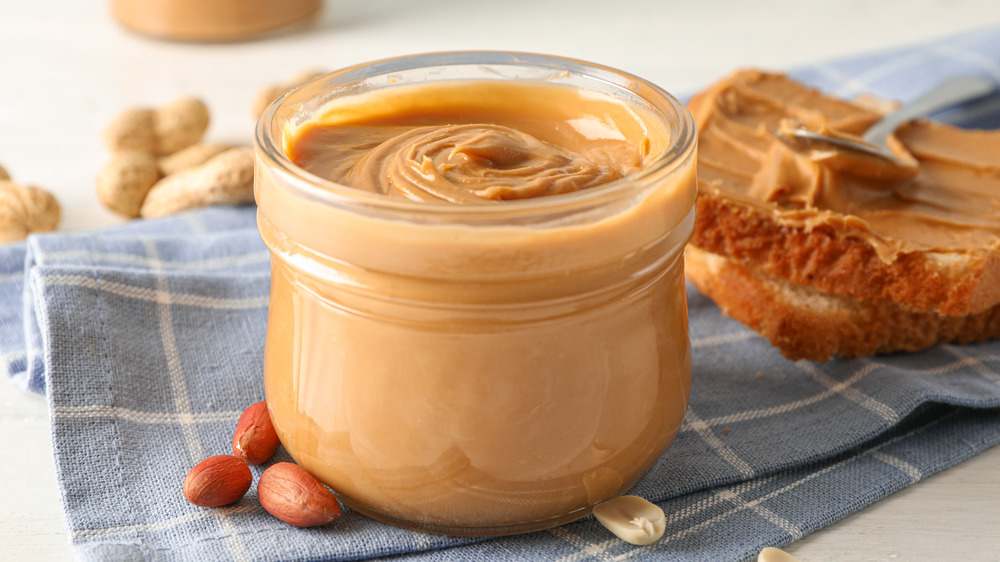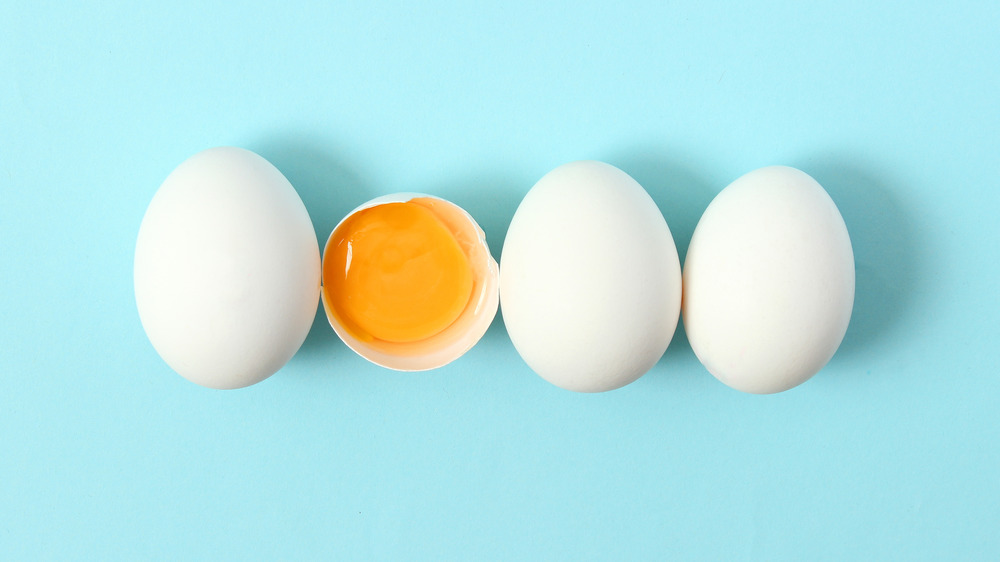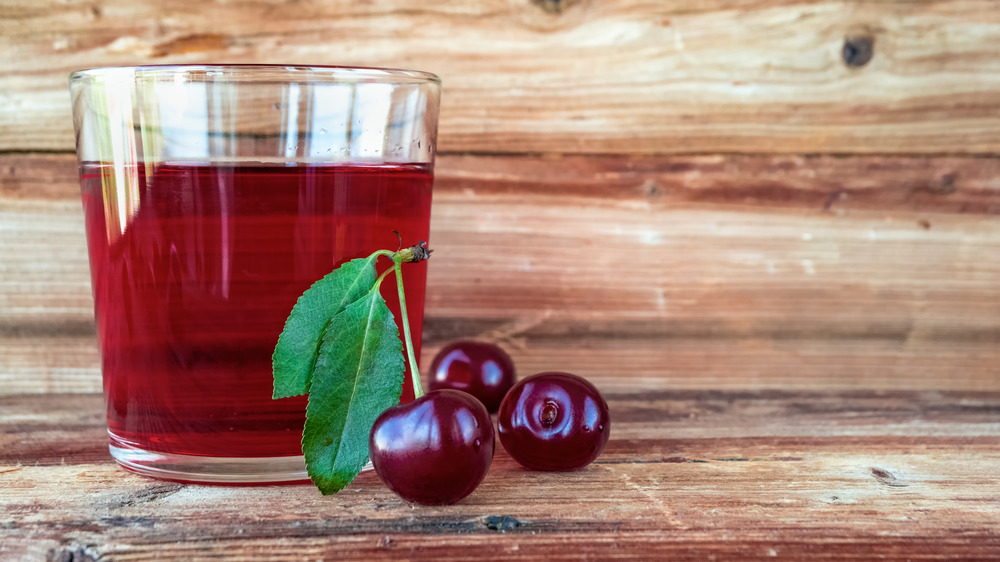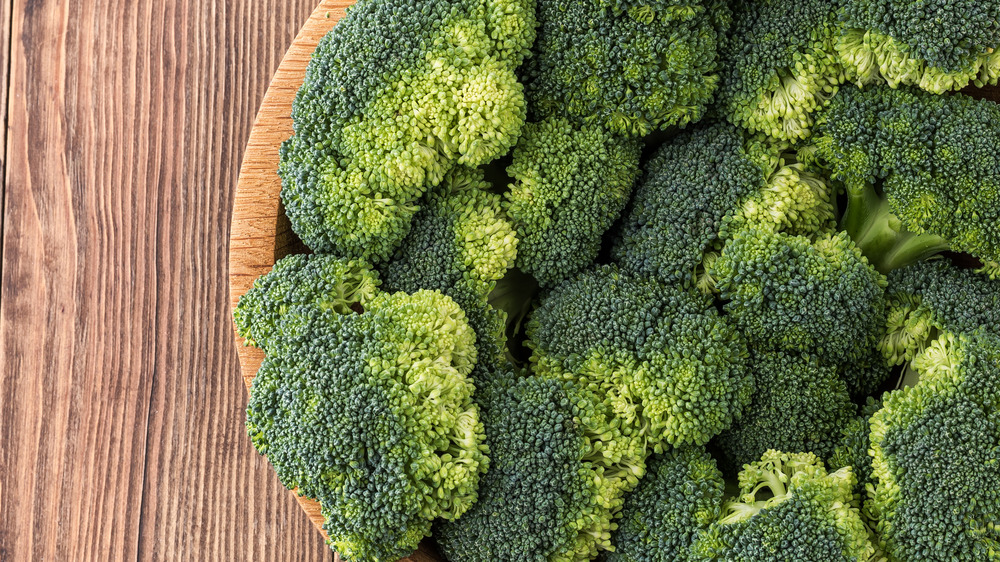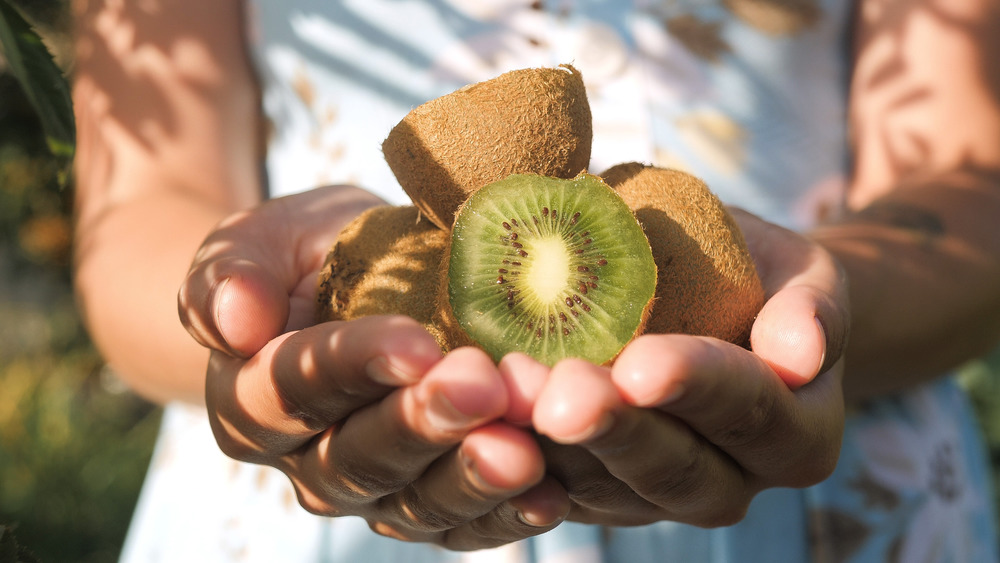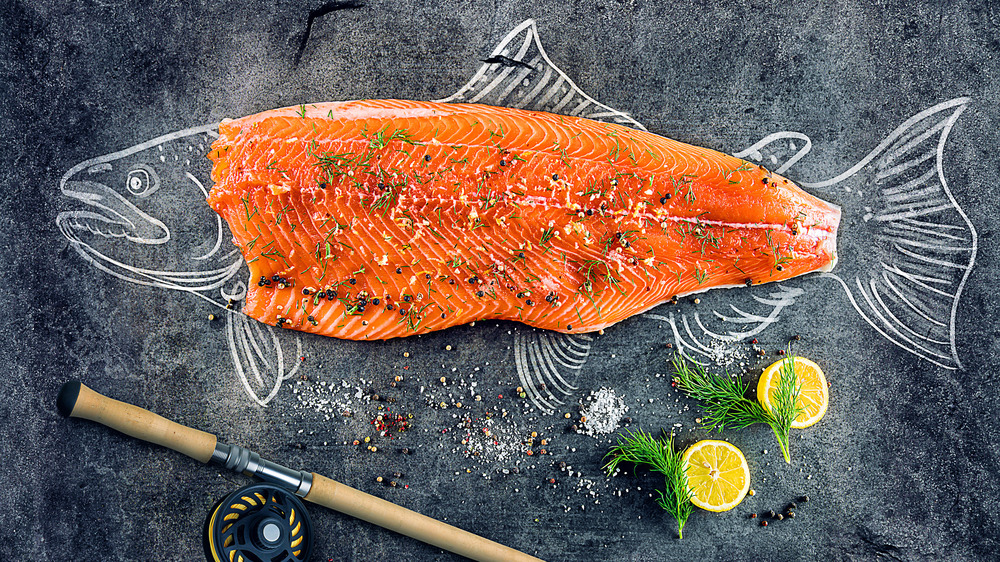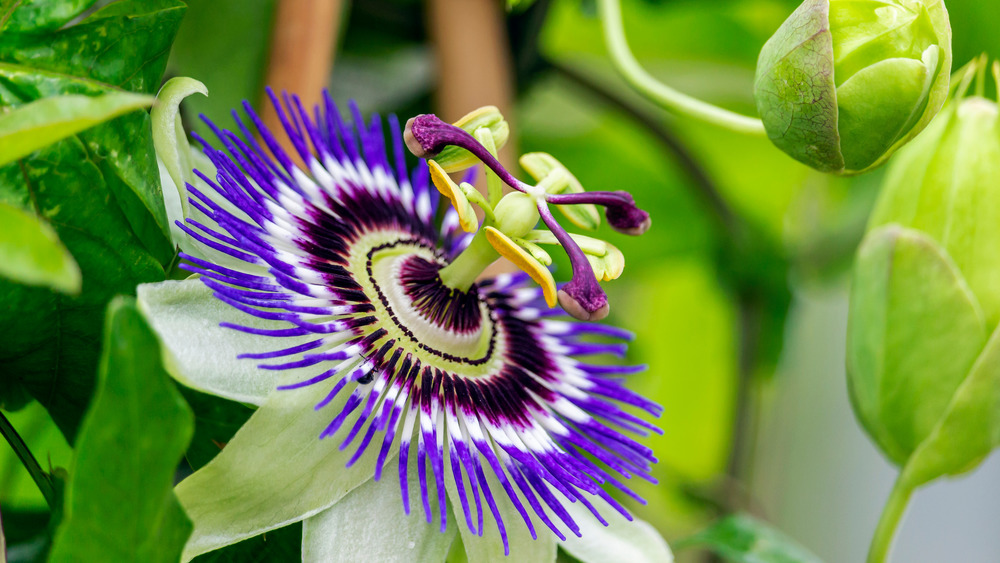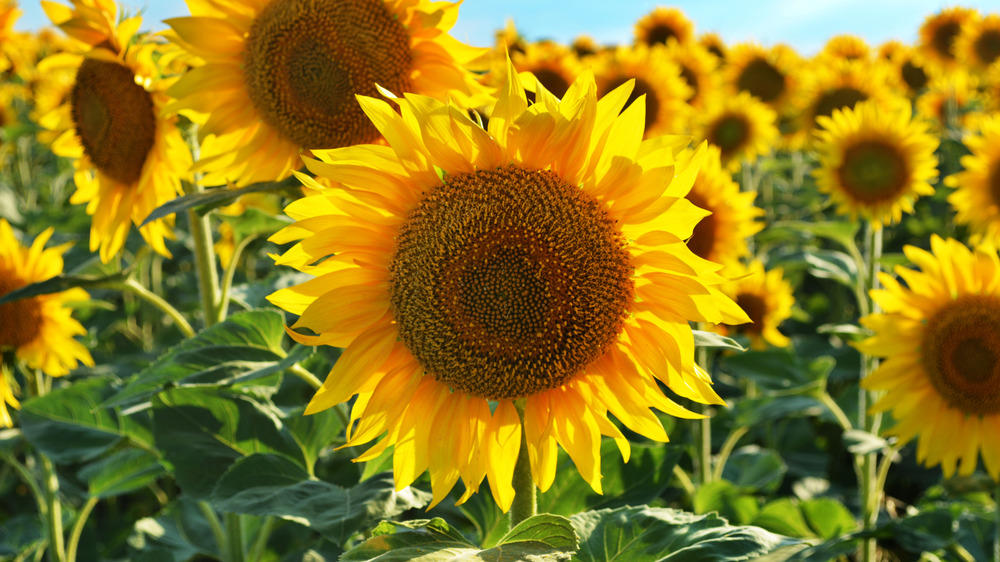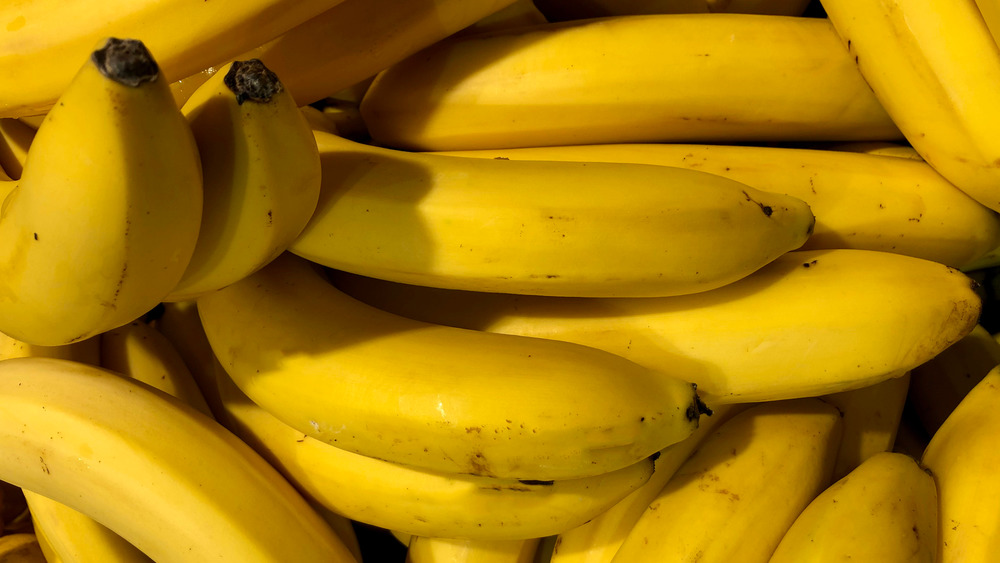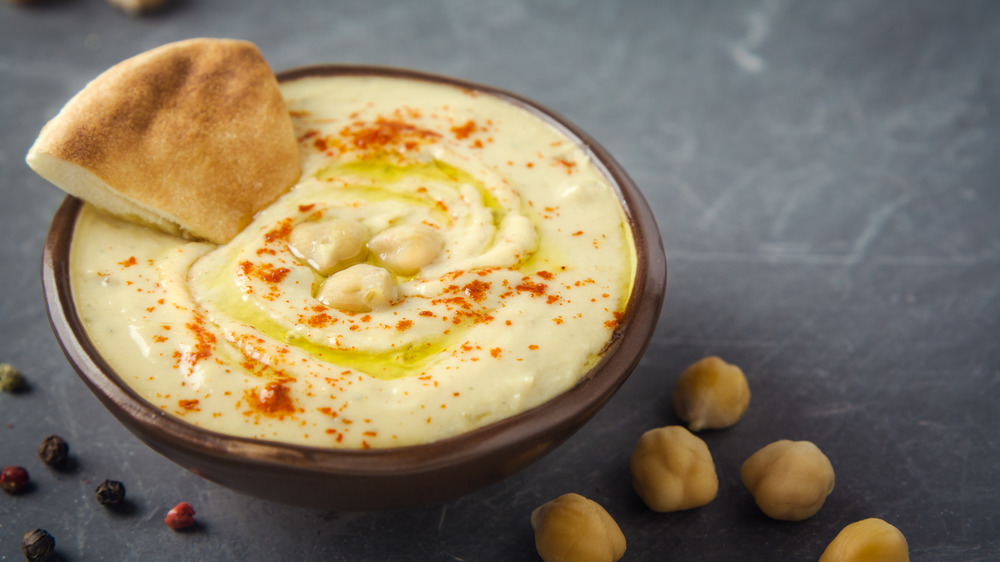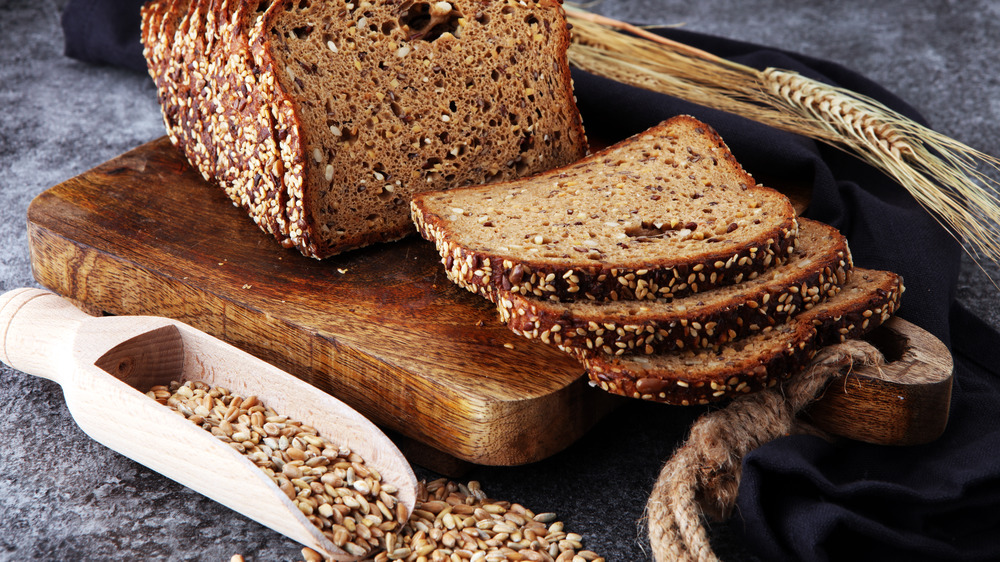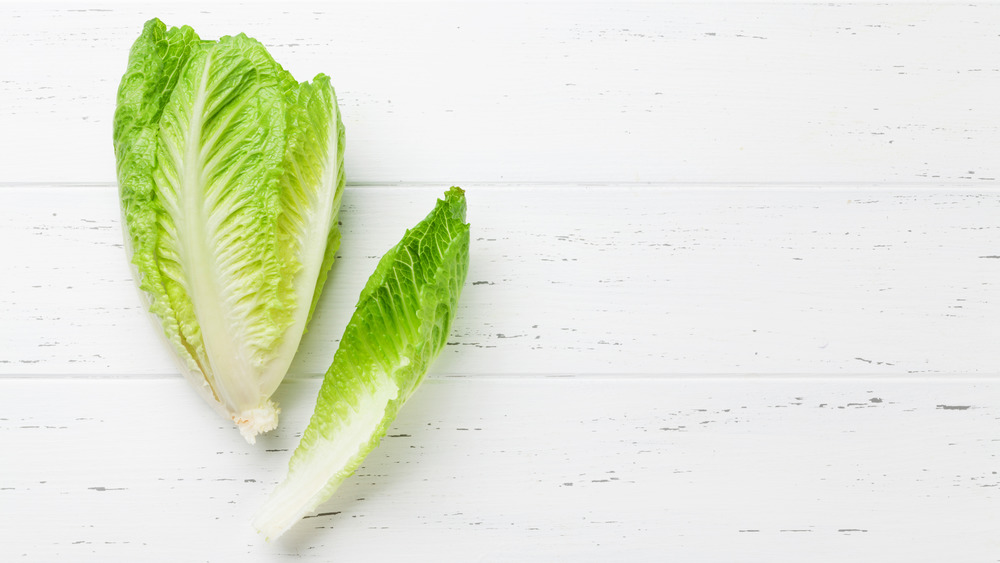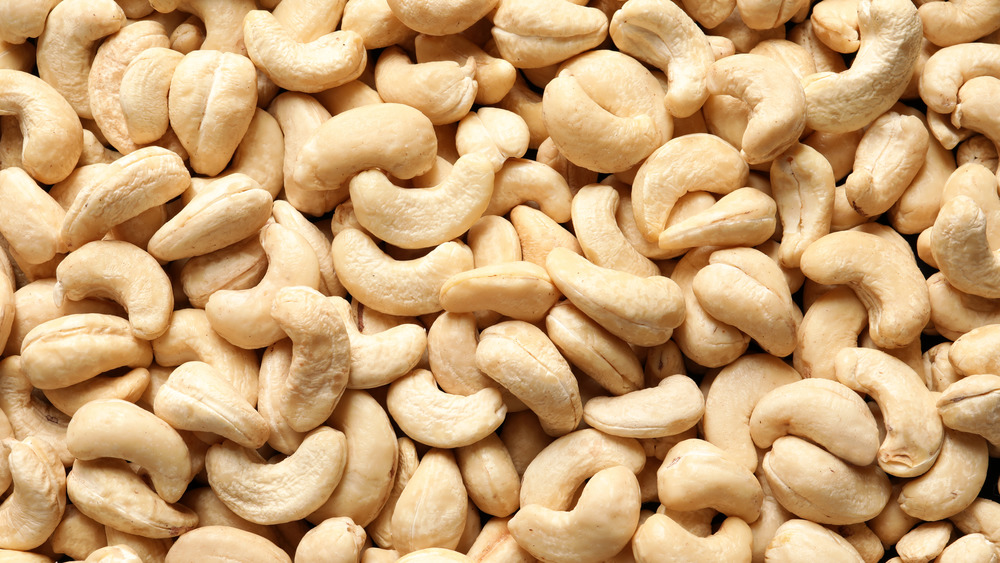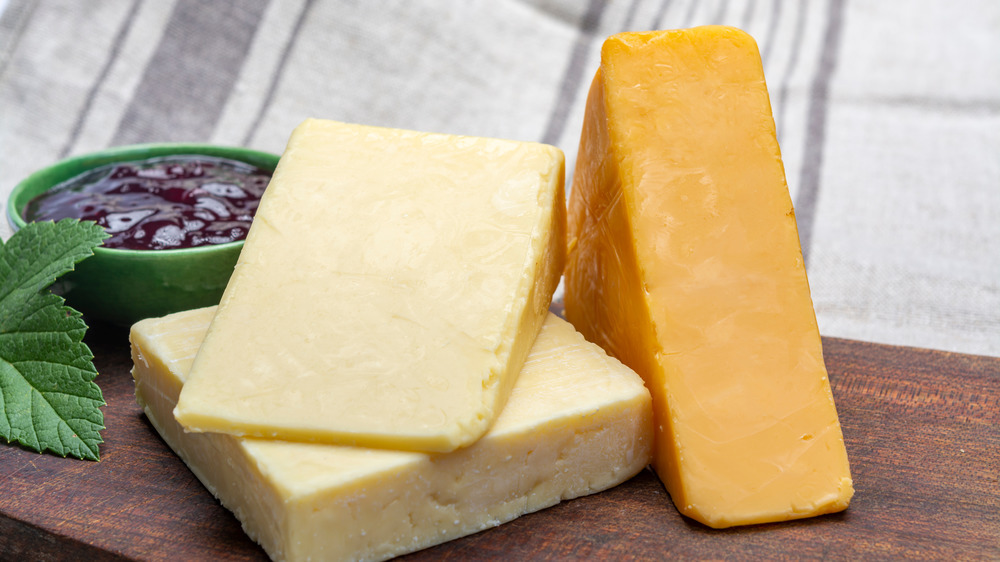Foods You Never Knew Could Help Your Sleep
How did you sleep last night? Did you drift off right away or toss and turn for a while? Did you stay asleep all night or go in and out of sleep? If you didn't get that restful recharge you needed, you're not alone.
According to the Centers for Disease Control and Prevention (CDC), one out of every 3 American adults is not getting seven or more hours of sleep a day on a regular basis. Is that such a bad thing, though? Well, sleeping less than seven hours per day is connected to a host of health issues like high blood pressure, obesity, stroke, and heart disease.
Fortunately, there are simple lifestyle adjustments that can help, including adding certain foods to your diet both during the day and right before bedtime. Of course, your individual health needs always come first, so you might want to check with your health care professional before changing your diet.
Peanut butter plus carbs can equal a good night sleep
Even if you have a peanut allergy, the following is still worthwhile reading. Why? Because in order to explain why peanut butter with carbs can help you sleep, we need to discuss two important components for a good night's sleep in general.
First, let's talk about serotonin. This neurotransmitter in your body has a number of functions, including helping regulate your sleep (via Healthline). Now, here's the twist: your brain can turn the amino acid tryptophan into serotonin. Yes, the same tryptophan that gets blamed for that Thanksgiving after-dinner "turkey coma" can help boost your serotonin levels — but there's a catch.
Just loading up on foods with tryptophan is not enough to reverse low levels of serotonin because your brain has a protective sheath around it (called the blood-brain barrier) that regulates what reaches your brain (via Healthline). Fortunately, research has revealed a way to trick this barrier: eat a combination of foods with tryptophan and carbohydrates (25 to 30 grams). For this reason, Healthline recommends peanut butter paired with pretzel sticks and a glass of milk as an ideal sleep-inducing snack.
The connection between eggs and sleep
Eggs are used in many recipes and some people eat them daily, yet they are often associated with breakfast. So, how can they help you get a good night's sleep? Wouldn't what you eat first thing in the morning help you wake up and become fully alert?
Well, much like peanut butter, eggs are a good source of tryptophan, which can help boost your body's level of serotonin (via Medical News Today). Speaking of serotonin, if you deal with seasonal affective disorder or SAD during the winter, you might also have low serotonin. Yet another good reason to control what you can like your diet.
Like with peanut butter, combining eggs with carbs is your best bet to improve your sleep (via Medical News Today). So, you may want to eat those sunny-side up yolks with some fresh fruit or whole-grain bread. Also, how you prepare your eggs is important for your overall health, so poaching or boiling is better than frying.
Tart cherry juice: a sweet sleep solution
When most people think of cherries, sleep is not usually the first thing that comes to mind. But a pilot study in the American Journal of Therapeutics found evidence that drinking tart cherry juice twice a day can increase how much you sleep at night by 84 minutes.
The secret to this little berry's sleep-promoting properties is its juice contains tryptophan. Plus, the berry's juice has an enzyme called procyanidin B-2, which helps prevent an enzyme in the human body called 3-dioxygenase or IDO from degrading the tryptophan. So, not only does this juice give you a good dose of something to help you sleep, but it also protects it from losing its potency as the body processes it.
Besides protecting tryptophan, the procyanidin B-2 enzyme in tart cherry juice also helps prevent the IDO enzyme in your body from causing inflammation (via American Journal of Therapeutics). The study concluded that this is another reason why these red berries may help you get a good night's rest.
Hit the hay with broccoli
Okay, so broccoli usually falls into two categories: you like it, or you hate it. But even if it's not your favorite vegetable, it might help you not only drift off to dreamland but also get better-quality sleep.
When you fall asleep, your body goes through different phases of the sleep cycle. The time you spend in the phases of deep sleep, as well as what's called REM sleep (short for rapid eye movement), are particularly important because that's when your mind and body make repairs (via PIH Health). Think of it this way: getting that good restorative sleep is like running software to clean up your computer's hard drive. And just like how your computer runs more smoothly after that cleanup, your body functions better, and you feel more alert after getting a good deep sleep.
So, how does broccoli fit into all of this? Well, that love-it-or-hate-it vegetable has fiber, which can help you stay in those deep sleep and REM phases longer (according to PIH Health). And if broccoli really isn't your thing, then you might want to consider other fiber sources like whole grains or beans.
Trouble sleeping through the night? Try kiwifruit
Yes, those green, fuzzy fruits that are sometimes paired with strawberries in smoothies can help you get a full night's sleep. As Healthline notes, one study found eating two kiwifruits an hour before turning in not only can help you fall asleep faster but also can help you stay asleep through the night.
While more research is needed on the impact of kiwis on sleep, the fruit does come packed with some natural sleep aids. For one, kiwifruit contains vitamin C and carotenoid antioxidants, both of which can reduce inflammation and, in the process, may promote a good night's sleep (via Healthline). There is also evidence to suggest that kiwi can impact your serotonin levels. Plus, it has fiber, which can help you stay in a restorative sleep (via PIH Health).
Beyond helping you drift off and stay in dreamland, eating kiwifruits can also benefit your health in other ways. According to Healthline, their carotenoids, as well as their fiber content, have been shown to help lower bad cholesterol and support your digestive system. They are also a good source of important nutrients like potassium, folate, and vitamin K.
Fatty fish is full of nutrients for good sleep health
The Godfather coined the now-famous movie phrase, "sleeps with the fishes," however, fish and sleep are not something that normally seem to go together. But eating the right kind of fish can actually help you maintain a regular sleep cycle.
As Medical News Today explains, fatty fish contains omega-3 fatty acids and vitamin D. Can these nutrients be turned into serotonin-like tryptophan? No, but they do help your body regulate your own serotonin, which may help you fall asleep faster, stay asleep a specific amount of time, and wake up and be alert at certain times.
In addition, a type of fatty fish, Atlantic salmon, is packed with other nutrients associated with good sleep health like magnesium, zinc, calcium, and potassium (via Medical News Today). In fact, one study found eating 300 grams of this type of salmon three times a week for six months promoted better sleep than other foods that offered similar vitamins and minerals, including chicken and pork. Oh, and one more bonus: omega-3 fatty acids can help regulate your heart's rate, which can also improve your sleep.
Add some passion(flower) to your nighttime routine
Despite the name, passionflowers do not make you feel passionate. In fact, as Healthline explains, these blossoms do the exact opposite and can make you feel calm, relaxed, and ready to hit the sack. But are they safe?
Well, it's recommended not to take 90 milligrams of passionflower in capsule form for more than two months (via Healthline). However, supplements and even extracts aren't your only options. Passionflower can be brewed into a tea that can be soothing right before bedtime. Nevertheless, you should check with your health care professional about if you should drink passionflower tea on a long-term basis.
The good news is there's evidence that passionflower can help not only with sleep disorders but also anxiety, muscle spasms, inflammation, pain, and even the side effects of menopause. But, if you do have a bad reaction to it, there are some warning signs to look out for like confusion, dizziness, inflamed blood vessels, and loss of coordination. So, again, it's important to keep your health care professional in the loop.
Drift off to dreamland with sunflower seeds
Just as fatty fish have nutrients that help your body regulate serotonin, sunflower seeds help your body turn tryptophan into serotonin (via Verywell Health). But there's still one more sleep component that needs to be addressed.
First, sunflower seeds, as well as foods like wheat germ and bananas, are chock full of vitamin B6 (via Verywell Health). Your body uses this nutrient to convert tryptophan into serotonin more efficiently. Now, for the elephant in the room: melatonin. You've probably seen supplements of this hormone, but naturally, your body converts serotonin into melatonin because it's this final form that helps keep your sleep cycle regular.
So, how does this fit altogether? Well, let's say you ate sunflower seeds and peanut butter on whole-grain bread before bed. The peanut butter has tryptophan. The whole grain bread has carbs, which would help the peanut butter's tryptophan get through the blood-brain barrier. Then, the B6 in the sunflower seeds would help your brain turn that tryptophan into serotonin (via Verywell Health). Your body would then change that serotonin into melatonin, which would help you fall asleep and stay asleep.
Looking for a better bedtime snack? Try a banana
While bananas may help as a sleep aid, you might be throwing away one of the most important parts of this fruit. Yes, the banana pee — the cause of so many slapstick comedy pratfalls — is also a sleep-promoting powerhouse.
As WebMD notes, bananas themselves are rich in tryptophan, so pairing it with carbs like eating a bowl of oatmeal with slices of bananas, may be the perfect sleepy time treat. Banana peels have vitamin B6, which helps your brain change tryptophan into serotonin. In addition, that peel also has fiber, which can help you stay in deep and REM sleep longer.
If eating a banana's peel isn't, well, appealing to you, that's okay. Rather than just taking a big bite out of an unpeeled banana, try leaving the peel on when you slice it up and add it to that bowl of oatmeal. And if that still isn't something you like, you can always lose the peel and add some sunflower seeds for B6 and kiwifruit for fiber to your nighttime snack.
The many ways hummus promotes good sleep
From lunch to party dips, hummus is not only a versatile food but also easy to make. A basic hummus recipe is garbanzo beans (also called chickpeas) combined in a food processor with lemon juice, olive oil, ground sesame seeds (called tahini), and garlic (via Healthline). And it's those little chickpeas that make hummus ideal for a restful night's sleep (via PIH Health).
For starters, chickpeas not only have tryptophan but also vitamin B6 just like sunflower seeds. So, not only do they give your body a fresh dose of tryptophan, but they also help your brain convert that tryptophan into serotonin. Plus, chickpeas are a good source of fiber (via Healthline), which can help you get a nice restorative sleep.
In addition, the olive oil and tahini in hummus have anti-inflammatory properties (via Healthline), making both ingredients beneficial for a good night's rest. If you're making your own hummus, try using virgin olive oil since evidence suggests it might be especially effective at reducing inflammation in your body. And PIH Health recommends spreading hummus on crackers or toast before bedtime to help you fall asleep.
Whole grains help you stay asleep
Carbohydrates can help tryptophan bypass the blood-brain barrier and help you sleep better. But do carbs offer any other sleep-inducing pluses? The answer is yes, but what pluses depends on the type of carb.
As the American Sleep Association explains, whole grains encourage your body to produce insulin, which can help your sleep. Wait, now insulin is a factor for good sleep? Yes, but in a simple way. According to an article published in the Journal of Physiology, insulin helps tryptophan bind to a protein in your blood called albumin. By "piggybacking" on this protein, the tryptophan is able to better penetrate the blood-brain barrier (via PubMed.gov). Plus, whole grains contain magnesium, which helps you sleep through the night (via American Sleep Association), and fiber, which helps you stay in a deep sleep (via PIH Health).
Besides whole grains, the American Sleep Association recommends white rice as a sleep aid since it can boost your blood sugar and in the process the amount of insulin in your body. However, if you are diabetic or are watching your blood sugar, you need to speak with your health care professional before adding new carbs to your diet.
Can romaine lettuce improve your sleep?
Lettuce is such a classic dieting staple that it's almost cliché. We know if someone is "stuck" with a basic salad when they want a nice, juicy steak, they're going to dub those leafy greens unappetizing "rabbit food." But don't write off this vegetable just yet. There is evidence to suggest that lettuce and in particular romaine lettuce can improve your sleep health.
According to a study from Food Science and Biotechnology, extracts from romaine lettuce plants helped mice fall asleep faster and stay asleep. This study also noted that lettuce seed oil has been used in folk medicine to help with sleeping issues, as well as to reduce inflammation and relieve pain.
Now, to be fair, it is still not known if just eating lettuce as opposed to an extract made from lettuce would have the same level of impact on your sleep (via WebMD). However, with all the other health benefits lettuce offers like supporting good vision, strengthening your bones, and helping to keep you hydrated, rolling the dice on adding a few more leafy greens may be worth it for your overall good health (via WebMD).
Catch some z's with cashews
Yes, those crunchy little cashews you might throw into trail mix or add to a chicken dish can not only be an effective sleep aid but can also help you tackle one of the most annoying sleep issues (via Men's Health Magazine). And, no, annoying in this case isn't your next-door neighbor's dog barking all night.
As the outlet explains, cashews are loaded with magnesium. In fact, a quarter-cup of this nutty little snack gives you around 20% of your daily magnesium needs. When your body doesn't have enough magnesium, the nerves in your body start firing too much, which can lead to problems sleeping, muscle cramping, and that incredibly irritating condition called restless leg syndrome or RLS. And as anyone who has RLS knows, it's hard to fall asleep when your legs constantly feel uncomfortable.
If you cannot eat cashews because of a food allergy, you can also raise your magnesium levels by eating whole grains (via American Sleep Association), as well as, almonds, sesame seeds, spinach, and swiss chards (via Men's Health Magazine). And if you have RLS, you might want to discuss possible treatment options with your health care professional.
Not drowsy before bed? Try snacking on black walnuts and cheddar cheese
By now, you've probably noticed that a combination of foods might be your best option for a good night's sleep. But let's be honest; at the end of a long day, you may not want to cook or prepare something even if you're a whiz in the kitchen — and that's okay. This final food pairing is a no-fuss, no-muss snack.
As Men's Health Magazine notes, black walnuts are loaded with tryptophan and melatonin. Now, keep in mind, black walnuts aren't the typical English walnuts you're probably used to seeing at the grocery store. However, they can be found in the supermarket's baking aisle or online. Pair them with cheddar cheese, which can have more tryptophan than turkey, and you have a simple sleep-inducing food combo.
Men's Health Magazine recommends eating four dice-size cubes of cheddar cheese. If you're looking for a trick to make this snack more convenient, cut up the cheese cubes ahead of time when you have the time and energy. You could even put the pre-portioned walnuts and cheese in a sandwich bag or container, so you have a quick grab-and-go bedtime snack.

